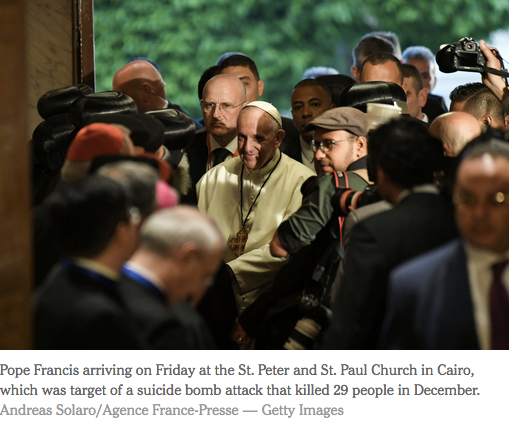CAIRO — Pope Francis delivered his most blunt and powerful message to the Muslim world on Friday when he began a papal mission to Egypt by warning against wrapping violence and terror in the language of religion.
“As religious leaders, we are called, therefore, to unmask the violence that masquerades as purported sanctity,” the pope said at a peace conference organized by Al Azhar mosque and university, one of the most influential centers of Sunni Islamic learning. He added: “We have an obligation to denounce violations of human dignity and human rights, to expose attempts to justify every form of hatred in the name of religion, and to condemn these attempts as idolatrous caricatures of God.”
The papal visit came at a critical time for Egypt, a country caught up in intensifying terrorist attacks, particularly against Christians, and a deepening crackdown by an authoritarian government.
On Friday, Pope Francis seemed to put on different hats during the day’s three stops, reflecting his interreligious, ecumenical and political roles.
At Al Azhar, he embraced the mosque’s Grand Imam, Ahmad al-Tayeb, who urged the West not to hold an entire religion “accountable for the crimes of any small group of followers.”
Pope Francis then turned to matters of state, seeking to encourage progress on human rights from his host, President Abdel Fattah el-Sisi. Mr. Sisi ousted the Muslim Brotherhood in a military takeover in 2013, and has since crushed dissent even as a recent report by the United States Commission on International Religious Freedom found he has incrementally improved security and religious freedoms for Egypt’s small Christian minority, which mostly supported his coup.
. . .
But Francis, while aware of the historical aspect of his visit, seemed to be pointing his message at the world powers today.
“Demagogic forms of populism are on the rise. These certainly do not help to consolidate peace and stability,” he said. “No incitement to violence will guarantee peace, and every unilateral action that does not promote constructive and shared processes is in reality a gift to the proponents of radicalism.”




